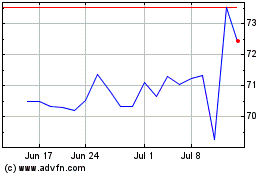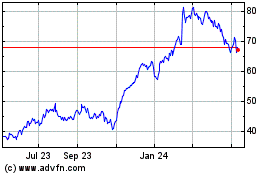By Tim Higgins and Parmy Olson
Uber Technologies Inc. and Lyft Inc. were part of a wave of
companies that built their businesses around the idea that
individuals could share their assets. The era of social distancing
has upended that sharing economy.
This week, the two ride-hailing companies will update investors
on the damage done by the coronavirus pandemic and how they plan to
adjust. Uber Chief Executive Dara Khosrowshahi already has pulled
guidance for the year, which included a plan to reach a measure of
profitability, and he faces questions Thursday about the need for
more cost cuts. Smaller rival Lyft, which reports results
Wednesday, has already announced job cuts.
The pandemic challenges the very model that supercharged these
and other businesses into some of the world's most valuable
startups. Uber, Lyft and Airbnb Inc., among others, now face
questions about consumers' willingness to participate in the
sharing--or gig--economy at a time when health experts and
government officials are recommending sheltering in place and
avoiding contact.
"The big question is how Uber and Lyft navigate the Street to
get comfort with what the business model looks like on the other
side of this dark valley," Daniel Ives, an analyst for Wedbush
Securities, said Tuesday.
The companies will be reporting results for the three months
through March that won't reflect the full impact of the coronavirus
because many parts of the U.S. weren't affected until the final
weeks of the quarter.
Expectations for the three months through June are worse.
Analysts expect Lyft's sales in the current second quarter to
total $560.8 million, half of what was expected in this period by
analysts at the end of February and down 35% from the year-ago
quarter, according to FactSet. Uber's current-quarter sales are
only projected to drop 7% year-over-year to $2.93 billion, but that
same estimate was at $4.26 billion at the end of February, FactSet
said.
"The impact on the sharing economy will be enormous, even
devastating," said Stephanie Balaouras, a vice president at
Cambridge, Mass.-based Forrester Research Inc. who studies tech
operations.
As society shut down, ridership plunged. Spending on Uber rides
dropped 85% the week of April 20 in the U.S. compared with a year
earlier, according to research firm Edison Trends.
Big cities are core markets for the ride-sharing companies.
Almost one in five Uber rides last year was booked in the metros of
Chicago, London, Los Angeles, New York City and San Francisco.
Those cities all have stringent shelter-in-place orders that have
been extended deep into the second quarter.
Lyft said last week it would cut 17% of its workforce on top of
temporary salary cuts and unpaid furloughs for the rest. Uber,
meanwhile, was discussing laying off 20% of its workforce to cut
costs, according to a report in The Information. Uber said in
response to the report that "the company is looking at every
possible scenario to ensure we get to the other side of this crisis
in a stronger position than ever."
Airbnb is cutting 1,900 employees, or 25% of its workforce,
co-founder and Chief Executive Brian Chesky said Tuesday, citing
the hit to the company's business from the pandemic. He also said
the company was narrowing its focus because it isn't clear when
travel will return and when it does, it won't be the same.
"Travel in this new world will look different, and we need to
evolve Airbnb accordingly," Mr. Chesky said in a memo to employees.
The drop in bookings has threatened Airbnb's plans to go public in
2020, investors say.
Uber's share price, off 5.6% in 2020, has held up better than
Lyft, which is down 38% this year, in part because of its
food-delivery operations. Online ordering from grocery stores and
restaurants has surged since the U.S. declared a national emergency
in March.
Analysts will be looking closely at Uber's results to better
understand what an increase of its Eats food-delivery business
means to the bottom line. Gross bookings of Eats deliveries may
rise 42% in the first quarter from a year ago, according to the
average estimate of analysts surveyed by FactSet, while staying
roughly in line with the fourth quarter.
Mr. Ives, the Wedbush analyst, said pressure on fees from
restaurants and local governments could offset any increase in
demand because of Covid-19.
Before the pandemic, Uber was spending heavily to grow Eats as
it faced heavy competition from DoorDash Inc. and Postmates Inc. In
the fourth quarter, Uber said Eats' adjusted loss from operations
widened by 66% to $461 million from the year-earlier quarter.
An increase in Eats deliveries has been helpful for Uber drivers
weighing decisions about whether to continue driving passengers and
risk being exposed to the virus, or face extreme financial
difficulty.
"I'm barely earning GBP100 (about $125) a week," said Tom
Millen, an Uber driver in London who stopped driving because he
didn't want to risk catching the virus. Previously, he made around
GBP1,200 weekly on Uber. He has been doing deliveries with Uber
Eats and grocery chains, and working in a warehouse to support his
family, including his wife and 10-month-old son.
In April, Uber announced it had begun shipping disinfectant
sprays to some drivers and was distributing masks with the first
shipment going to New York City. The company said it had ordered
tens of millions of masks.
Uber and Lyft have faced pressure from regulators and lawmakers
over how their drivers are classified, and on Tuesday California
sued the companies, citing the state's gig-economy law that became
effective Jan. 1. The state said the ridehailers' decision to
classify drivers as contractors rather than employees has deprived
them of rights such as paid sick leave and unemployment
insurance--two issues made more visible during the pandemic.
As shutdown orders lift, Uber and Lyft may benefit from
customers choosing a ride to work because they are wary of
returning to the close quarters of public transportation.
"When you're [packed] against people and you hear distant
coughing, I think there's nothing worse in terms of the human
psyche right now because there's just so much fear," Brian Roberts,
Lyft's chief financial officer, said in March.
Write to Tim Higgins at Tim.Higgins@WSJ.com and Parmy Olson at
parmy.olson@wsj.com
(END) Dow Jones Newswires
May 06, 2020 08:14 ET (12:14 GMT)
Copyright (c) 2020 Dow Jones & Company, Inc.
Uber Technologies (NYSE:UBER)
Historical Stock Chart
From Jan 2025 to Feb 2025

Uber Technologies (NYSE:UBER)
Historical Stock Chart
From Feb 2024 to Feb 2025
